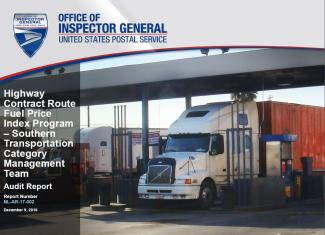Highway Contract Route Fuel Price Index Program – Southern Transportation Category Mgmt. Team
Background
The U.S. Postal Service uses supplier-operated highway contract routes (HCR) to transport mail and equipment between plants, post offices, or other designated points that receive or dispatch mail. HCRs include Transportation and Contract Delivery Service (CDS) routes, which make up the largest single group of transportation services that the Postal Service uses.
In fiscal year (FY) 2015, the Postal Service spent about $713 million on fuel for HCR suppliers. In FY 2016, the projected fuel cost is about $513 million.
The Postal Service Transportation Category Management Teams (TCMT) are required to negotiate and evaluate in writing with the HCR suppliers to establish the contract's baseline fuel price per gallon (ppg). The negotiations and evaluations are intended to establish the HCR supplier's market cost of fuel at the time of contract negotiations.
The Postal Service subsequently uses the U.S. Department of Energy (DOE) regional fuel indexes to adjust the monthly fuel ppg when any of the DOE's nine regional fuel index prices fluctuates by $.05 or more in a single month.
The TCMT oversees the HCR contracts. They are located in Largo, MD; Windsor, CT; Denver, CO; Memphis, TN; and Tacoma, WA; with a satellite office in San Juan, Puerto Rico. We selected the Southern TCMT because they manage over 3,000 HCR contracts and administer the Postal Service's automated fuel adjustments using the DOE regional fuel index.
The Southern TCMT manually enters the DOE's monthly-published fuel index prices in the Transportation Contract Support System (TCSS), which automatically calculates monthly adjustments for HCR contracts nationwide.
Our objective was to assess the effectiveness of the Postal Service's FPI program at the Southern TCMT in Memphis.
What the OIG Found
We found that the Postal Service did not effectively establish the contract baseline fuel ppg; however, the FPI automated fuel adjustment process was generally effective.
The Southern TCMT did not ensure the established contract baseline fuel ppg reflected local market conditions and the baseline was largely unsupported. Specifically, we found 176, or 86 percent, of the 204 contracts we reviewed did not have documentation to support the negotiated contract baseline fuel ppg. We also found the 204 sampled contracts did not have the proper justification and documentation for evaluating and modifying the contract baseline fuel ppg. This occurred because management did not develop contract fuel baseline ppg policies and procedures for negotiating with the HCR supplier. Additionally, because management oversight was insufficient, the Southern TCMT was not following the fuel certification process for evaluating contract baseline fuel ppg and determining if it reflected local market conditions. Consequently, the Postal Service is at risk of overpaying HCR suppliers based on unsupported baseline fuel ppg.
We used the DOE's regional fuel index as a benchmark price for all HCR contracts administered by the Southern TCMT between April 2014 and March 2016. Our comparison determined that the Postal Service incurred annual excess fuel costs of about $3.8 million.
In addition, we conducted a separate analysis to understand fuel price market conditions and because Postal Service management identified that retail prices could be lower than the DOE rate. We used a national online fuel pricing service to compare 12 of the higher priced contract baselines to local fuel prices. We found that the Postal Service on average was paying about $1.08 more per gallon compared to local fuel prices and the published DOE regional indexes for the reviewed contracts. We made a referral to OIG's Office of Investigations concerning this issue.
We found that the FPI automated fuel adjustment process w as generally effective. We reviewed and analyzed about 73,000 automated monthly FPI adjustments made between April 2014 and March 2016 and determined that about 67,200, or 92 percent, were timely and accurate.
The remaining 5,800 fuel adjustments, or 8 percent, were incorrect. The majority of incorrect adjustments were due to manual input errors of the monthly DOE regional fuel index prices in January 2015. The errors were corrected in February 2015 without monetary impact to the Postal Service. Additionally, the Southern TCMT instituted a double-check verification process for inputting rates to avoid future errors. Accordingly, we are not making a recommendation in this area.
What the OIG Recommended
We recommended management develop and implement as soon as practical a national policy and procedures for establishing the contract baseline fuel price per gallon to ensure adequate oversight and documentation for current and future contracts. In addition, we recommended management develop and document market analysis to determine the lowest fuel price per gallon for each highway contract route that incorporates at a minimum the U.S. Department of Energy regional fuel index as well as local market fuel pricing. If the negotiated price is greater than the market analysis, the contracting officer must provide supplier documentation and written evaluation substantiating that this is the best value.

